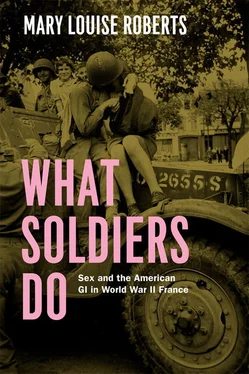Despite such obstacles weighing against de Gaulle and the CFLN, they strongly resisted the AMGOT plan. 8As soon as the Americans began liberating French towns, de Gaulle installed his regional commissaires in them, winning control over the country in an illegal manner. Shortly after D-day de Gaulle arrived in Normandy and was acclaimed by crowds in Bayeux and throughout the region. The Allies continued to dismiss him, however, and refused to formally recognize his government until late October 1944, almost five months after the invasion. 9This Allied reluctance became reason enough for de Gaulle, his struggling CFLN, and the Resistance generally to deeply suspect American intentions in France. Although the Allies eventually abandoned AMGOT, it persisted in the form of rumors, fueling the belief that the Americans were there to dominate rather than liberate. 10
Interactions between US military officers and French authorities at the local level during the summer of 1944 discredit such rumors. Reports filed by de Gaulle’s commissaires in Normandy demonstrate that Franco-Allied relations varied widely over the region and lacked any pattern of aggression. The experience of François Coulet, de Gaulle’s commissaire in Normandy, is a case in point. 11On the one hand, Coulet wrote reports to Paris complaining that US officers in Normandy refused to recognize his authority and were attempting to make arrests and force local elections. 12On the other hand, Coulet’s correspondence also includes assurances to the French Army that the Allies had not made any laws or appointments without the consent of authorities like himself. 13Where tensions between the GIs and the French government existed, they appeared to be local skirmishes rather than the result of any strategic plan.
In fact, no firm principle concerning sovereignty guided US military officials in their dealings with the local population. Partly this plan was strategic: the two nations would form a military association, uncomplicated by political commitments, until the war was won. 14In addition, a fundamental ambiguity confused power relations between the two nations: unlike Germany, Japan, or even Italy, France was both a US ally and a conquered state. On the one hand, the massive force of the American military and its status as liberator of the French people left little doubt who was in control. On the other hand, Charles de Gaulle struggled successfully to establish some degree of political autonomy. Muddled lines of authority also vexed Civil Affairs (CA), the branch of the US military that assumed primary responsibility for restoring order in liberated territories. Civil Affairs was to further the war effort by controlling population flows and establishing basic services in towns and cities. According to French journalist Jacques Kayser, CA officers tried to avoid questions of politics and collaborate peacefully with commissaires such as Coulet. 15In cases where property disputes were to be settled or Nazi collaborators removed from office, local authorities often stepped in to do the job. 16But in some areas, CA officers also set up elections, detained criminals, and closed businesses, provoking vigorous protest.
Ambiguity in the lines of authority conferred greater importance to sexual relations and how they might be managed. Struggles between American and French officials over sex—which brothels would be declared off-limits, how to police streetwalkers, how to contain venereal disease, how to prosecute accusations of rape, how to keep the streets safe at night—rekindled the unresolved question of who exactly was in charge. In the absence of a clear directive, such clashes, which took place at all levels of US military command and French state bureaucracy, became a means to work out the issue of French national sovereignty. In this way sexual relations anchored a struggle for power between France and the United States.
This book, then, explores how sex was used to negotiate authority between the two nations. While it addresses larger issues of international relations, its evidentiary approach is close to the ground, specifically, the Norman bocage where the GIs and French civilians got to know each other during the summer of 1944. Because this book engages the question of how the human body, in particular the sexual body, is historically implicated in relations of power, it attends to the sights, sounds, tastes, and smells of the American invasion—in other words, its visceral impact on the French senses. It then goes on to focus on three kinds of sex between GIs and French women during the US military presence: romance, prostitution, and rape. Sex took place between individual persons, sometimes in public but more often in homes and bedrooms. Despite their private nature, however, sexual relations came to possess larger political meanings and provided crucial models of dominance and submission. Paying female civilians to have sex taught millions of GIs to expect subservience from the French. Similarly, watching women sell their bodies—or worse still, hearing their stories of rape—forced French men to recognize their own diminished position in the world. In these cases, the French female body realigned power relations between the two nations.
Because the US military equated France with libidinal satisfaction, sex became integral to how it construed the Normandy campaign. With very few exceptions the GIs had no emotional attachment to the French people or the cause of their freedom. 17How, then, to motivate the soldiers to fight? In other theaters of war, military propagandists had used pinups—images of gorgeous all-American girls like Rita Hayworth—to conceive the nation in a way they believed would inspire the soldiers. Similarly, they billed the Normandy campaign as an erotic adventure. In particular, a photograph featuring a happy GI embraced by ecstatic French girls presented the American mission as a sexual romance. (See figure Intr. 2.) Disseminated in the military press, this photo portrayed the invasion in mythic terms as a mission to save French women from the evils of Nazism. Victory was defined as putting a smile on the face of la française who would duly reward the soldier with a kiss. In this way, propagandists played not only on sexual fantasies, but also the GI’s desire to be a manly soldier—to rescue and protect as well as destroy and kill.

FIGURE INTRO. 2. The manly GI. Photo © RDA/Getty Images.
Propagandists had no idea that such a myth of the Normandy mission would eventually lead to something like the situation in Le Havre. Once aroused, the GI libido proved difficult to contain. In fact the myth sprang from two wells of uneasiness on the part of the US military. First, it shored up a weary manhood. American soldiers in Italy had been sorely tested by loss, grief, and death. The acts of rescue, protection, and sexual dominance all restored a GI’s sense of manliness crucial for the successful prosecution of the war.
Second, the myth seemed to address military fears that the GIs were not ready for a new, more global American role. Political stewardship was new to the United States, a nation that in one generation had shifted from being an isolationist country to a world power. In a much-discussed editorial appearing at the time in Le figaro , the well-known French political scientist André Siegfried characterized the United States as quite suddenly attaining stature as a “giant.” Some years before, Siegfried’s very popular book America Comes of Age (1927) had declared the United States to be a new and formidable European rival. 18Now, Siegfried noted, Americans seemed to have embarked on a voyage for global engagement without having chosen it. Despite their indisputable military might, Americans still clung to isolationism economically, and were afraid of being “had” by Europeans in political matters. 19Siegfried got it right when he argued that the Americans were caught between what they had become to others and how they saw themselves. The GIs landing on French soil had to learn their new position as “giants.” Conceiving the war as a valiant rescue mission provided an accessible and appealing way for the GIs to understand that role. If global leadership entailed sexual romance with French women, what was not to like?
Читать дальше













